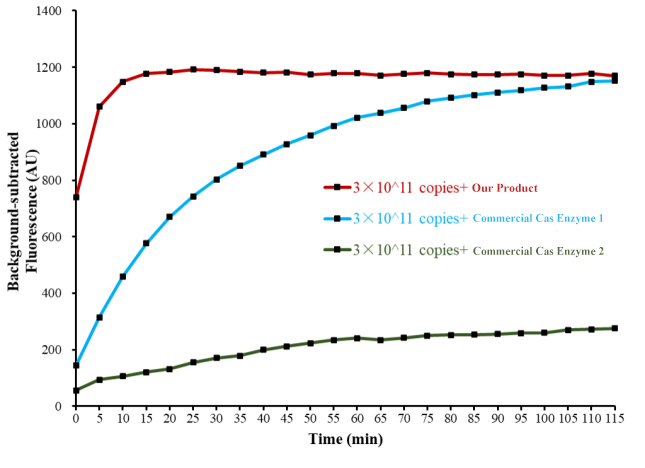LwaCas13a Nuclease
LwaCas13a nuclease is a crRNA-mediated nuclease. By designing single-stranded RNA labeled with fluorescent moieties or other small molecules at both more





Size
100pmol 500pmol 1000pmol
Quantity


Product Description
LwaCas13a nuclease (also known as C2c2) is derived from Leptotrichia wadei bacterium strain. LwaCas13a belongs to class II type VI CRISPR effector proteins, which are crRNA-mediated nuclease that activate accessory cleavage activity upon recognition and cleavage of target RNA, and can non-specifically cleave single-stranded RNA (ssRNAs) in the system. By designing single-stranded RNA labeled with fluorescent moieties or other small molecules at both ends, the detection and signal amplification of the RNA template by CRISPR/Cas13a can be realized. The results can be observed by fluorometer and test strips.
Product Components
| Component | EDE0001-100 | EDE0001-500 | EDE0001-1000 |
| LwaCas13a Nuclease | 5 μM*20 μL (100pmol) | 5 μM*100 μL (500 pmol) | 5 μM*200 μL (1000 pmol) |
| LwaCas13a Cleavage Buffer (5×) | 500 μL*1 tube | 500 μL*4 tube | 1mL*4 tube |
Test Reaction System
| Component | Final Concentration | Volume ( μL) |
| 5 μM LwaCas13a | 50 nM | 0.2 |
| 5 × Cleavage Buffer | 1× | 4 |
| 10 U RNase Inhibitor | 0.5 U | 1 |
| 500 nM crRNA | 25 nM | 1 |
| 2 μM ssRNA Reporter | 125 nM | 1.25 |
| 1 μM RNA target | 50 nM | 1 |
| DEPC H2O | ||
| Total | 20 μL | 20 μL |
Reaction Conditions
Use a real-time fluorescence quantitative PCR machine or an isothermal amplification instrument to detect the fluorescence signal. The reaction should occur at 37°C, and the fluorescence signal should be collected every 30 seconds. Alternatively, the fluorescence signal can be directly observed under a UV light.
Cross-Analysis of Competitive Performance
Fig 1. Results of Cas13 collateral cleavage at different product. The abscissa is the reaction time, and the ordinate is the detection result of Bio-rad CFX96 fluorescence PCR instrument. As can be seen from the figure, under the same conditions, this product can completely cut the RNA reporter probe and reach the fluorescence peak within 20 minutes, while other similar products have significantly lower fluorescence values and slower reaction speeds, which shows that this product has significant cutting efficiency. Higher than similar products.

Storage Conditions and Shelf Life
The product is stable for 1 year when stored at -20°C. For long-term storage, it is recommended to store at -80°C. It is advised to aliquot the product based on the frequency of use to avoid repeated freeze-thaw cycles.


 Login
Login






